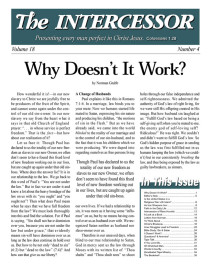
Editor’s Note
This issue of The Intercessor once again presents the Total Truth of the Gospel as proclaimed by the Apostles, and others in more modern times. We see some of mans struggle: the desperation of Romans 7, as well as the triumphant faith that so characterized many in the Bible and for which we are also called.
In our lead article Why Doesnt It Work? Norman Grubb sets about untangling the lie with which we have been deceived — that we are independent persons and live our own lives. Unfortunately, the title depicts so many of the failings and misconceptions of Christians. Norman untangles the lie and points us to the truth through an analysis of Romans 7. Norman recognized that a thorough understanding of Romans 6-8 is crucial to our grasp of our union with Christ, and he wrote about these chapters throughout his life. We include a similar analysis, though written 30 years earlier, It Doesnt Work? Brett Burrowes follows along that same vein in Bible Study — Sin and Satan in which he first identifies Satan as the problem, and second, offers the solution: the precious blood of Christ. Tape Talk similarly continues with Normans study of Romans. In a descriptive statement Norman says, This letter takes us through the process of what it is to be a true human. And he thoroughly delves into the kernel of the gospel — Romans 6-8.
Honesty is essential to this same process as well — as Colette Varanouskas reminds us in her review of Normans small book Continuous Revival. Small in size, though not in content, Norman emphasizes the two-way relationship for which we are called — roof off, walls down — vertical with God and horizontal with man. A clear channel is what the Holy Spirit must have to fight the devil, says Rees Howells, as he describes the daily dyings the Lord took him through to make this a reality in his life.
Christs Etceteras reveals the heartbeat of C.T. Studd as he sends an urgent, passionate battle cry to the Christians for the purpose of spreading the Gospel to the unevangelized people around the world. This is as timely today as when he wrote it in 1915. Another piece entitled If You Love Me… finds F.B. Meyer relating the life-transformation he experienced upon meeting the young C.T. Studd and asking the question How can I be like you?
In As Iron Sharpens Iron, we find two of our young adults burdened by the sin that has strewn wreckege in their own lives, but now are equally burdened to share the good news of Christ with friends who have no answer.
In Inner Struggles Lead to Freedom, Irene Gilsenan contrasts the struggles of her out-of-control life with that of trusting Christ to live His life through her. No matter the details, the principles and answers are the same for each of us and this is a story to which we can all relate. Faith in the Daily Life is a reminder of the fully-functioning faith that the men and women of the Bible personified. Norman described several of them as they faced the giants of their day and came out victorious as they declared the outcome by faith.
In our day — the 21st century — what is the Christians responsibility to speak out about world affairs? What is the participation to which we as a body are called? We have been asking ourselves these questions and believe we have an obligation to formulate some answers to the current crisis our country confronts. As a result, we are proud to introduce a new column tackling these more controversial questions. Tommy Prewitts excellent piece, Is the United States in a Religious War with Islam? is the first in this series.
We hope this issue of The Intercessor is helpful to you in your walk of faith, and as always, we would appreciate hearing from you.





